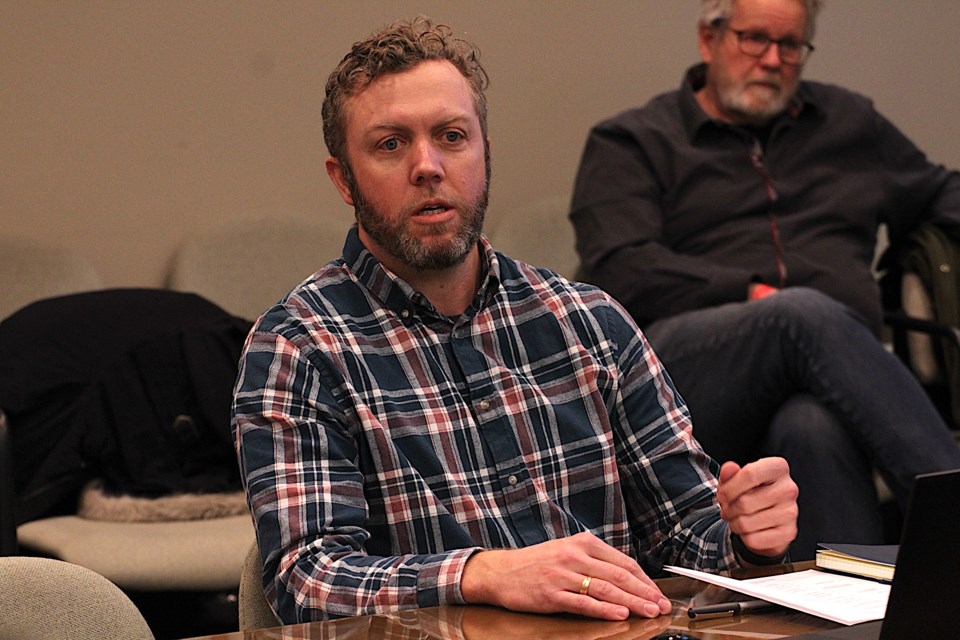ATHABASCA - The Town of Athabasca may have the opportunity to take part in a community cohort aimed at moving municipalities towards a net-zero energy footprint, but they’ll have to act fast to secure one of the last two spots.
During their Jan. 9 meeting, councillors voted 7-0 in favour of a motion to refer the presentation to the Regional Municipal Climate Action Committee (RMCA) after a presentation from Seth Leon, who oversees QUEST Canada’s projects and programs, including the Net-Zero Communities Accelerator (NCA) program.
Leon said his prior work with Dr. Mike Gismondi, an Athabasca local and retired Athabasca University prof, as well as earlier work experience in the region brought the town to mind when considering communities for QUEST’s cohort — the non-profit is looking for communities who are on the road to becoming a net-zero community, and is hoping to aid the municipalities to achieve their energy and emissions goals.
“Athabasca seems like a really great place, and it seems like there’s a good understanding of where the community could go and what are the opportunities, as well as a real understanding of how changes impact the community for energy transition,” said Leon. “There’s a high level of energy literacy and problem solving, not on a provincial level but asking how can we solve these problems for our community and our region?”
The project comes with a one-time cost of $3,000, as well as a committed point of contact, who will help identify stakeholders, provide information, and provide 80 to 120 hours between now and October 2025 to undertake program activities.
“I’ve always been really impressed with the level of interest around energy transmission, as well as the level of activity and problem solving that’s happening in this community,” said Leon.
Gismondi, who chairs the RMCA said the program is a great opportunity for the town, which he said is currently big on ideas but short on funding. In preliminary discussions with RMCA, Gismondi said the committee had identified three possible projects QUEST could help with, and they felt they were in a good position to get involved.
“There’s a local group that’s interested, the municipality is struggling and lacks capacity and expertise, and QUEST gives you access to the Community Energy Co-Op,” said Gismondi. “They are helping communities do audits, size the work they’re doing, figuring out how to hook up to the grid, they do all that stuff. I thought, ‘That’s perfect, that’s what we need.’”
QUEST is looking to build a cohort of 15 communities across Alberta, Saskatchewan, and Manitoba for their NCA program, which is based on a previous cohort in New Brunswick. QUEST’s initial cohort brought back data showing that every one per cent reduction in energy use kept between $5 and $14 million dollars in the local economy for small and mid-sized communities.
QUEST breaks municipalities down into three types of participants: seekers, who are “curious about community energy and emissions planning,” but haven’t started planning; doers, who have someone in the community responsible for a Community Energy and Emissions Plan (CEEP); and leaders, who are “well on their way to becoming a net-zero community.”
Leon sees Athabasca as a doer, although he did say that if the town was able to complete its goals they would be a leading example for prairie communities.
“Some of the infrastructure is there, and the other aspect is some willingness to apply it,” said Leon. “If we look at the leader criteria, that’s in (Athabasca’s) sights. They can say that if they do this work they’ll be a leading community.”
Currently Athabasca runs a Clean Energy Improvement Program (CEIP), where property owners are able to finance energy efficiency and renewable energy upgrades through their property taxes, but despite the program having been in place since Oct. 19, 2022, no one has completed the application process. Councillors Ida Edwards and Sara Graling noted that the process was lengthy and required a substantial amount of independent research from the homeowner.
“I think that would be a great program for this, working with the Municipal Climate Change Action Centre (MCCAC), they’re looking for feedback on how to do it better,” said Leon. “As we were discussing project ideas, this would be really good not only for your community, but as a test case for MCCAC to improve the program going forwards.”
The NCA wouldn’t be the first project of its type the town has tried to get going in the past. Gismondi said previous projects aimed at increasing Athabasca’s energy production had fallen apart at the last minute after grant windows were missed or the projects were simply denied.
“The cost of energy is going to keep going up, and with solar’s lifespan being 25 years, you’re going to get your money back sooner than that,” said Gismondi. “If we had gotten lucky four or five years ago, we would probably be doing pretty well right now in terms of production, making money, and earning back our investments.”



